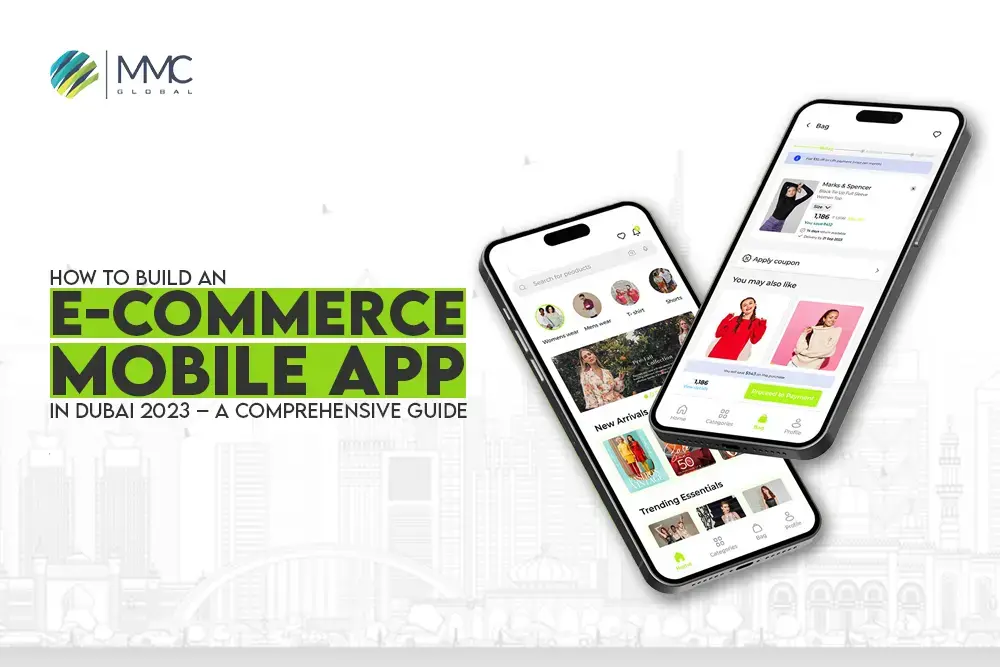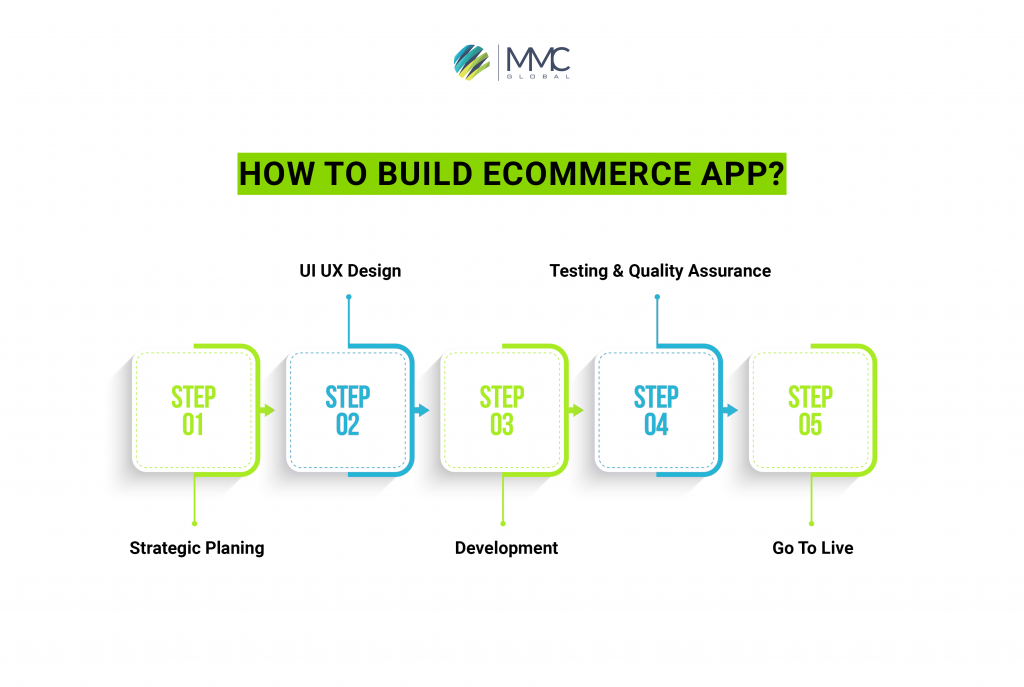How To Build An Ecommerce Mobile App In Dubai 2023 – A Comprehensive Guide


The rapidly evolving eCommerce businesses are now fully integrated with people’s lives, and more or less, people are comfortably shopping around the globe with just one tap in eCommerce mobile apps. In fact, Alibaba, Amazon, and Walmart are the most popular eCommerce platforms that help people trust online shopping. These platforms epitomize the best digital shopping experience on all marketing touchpoints, providing the biggest platform to buy countless things. Not only for buyers but sellers also get lucrative opportunities to sell their products or services.
In Dubai, people live a luxurious life and spend money shopping; they also opt for eCommerce online shopping stores to save time. The best option for them is to have a fully functional eCommerce mobile app in their hand.
In fact, if you belong to the eCommerce market and want to grow your eCommerce business in Dubai, be on your toes and invest in the eCommerce mobile app. Let’s get the ball rolling!
Ecommerce Mobile App – What and Why?
Mobile applications are the best way to engage customers and prospects. As the use of smartphones has grown, everyone has multiple apps downloaded into their phone for ease. It may be a grocery app, food delivery app, cab booking app, eCommerce shopping app, etc.
However, the eCommerce mobile app is an expedient platform that encourages users to buy effortlessly by sitting at home. Online shopping with mobile apps is orthodox for us. The eCommerce mobile app market is highly compatible, and you need innovative ideas to make your business stand out.
However, the importance of mobile applications in the eCommerce market is undeniable, as they provide ease to the customers, instant accessibility to their desired needs, online payments, multiple options, and much more.
E-commerce gives tremendous opportunities to almost every industry that provides goods or services. How convenient is it to order food from your favorite restaurant? They all lie in the eCommerce or online businesses.
You do not need an online mobile app platform to make your eCommerce business profitable, but a functional and well-versed mobile app platform is required.
Establishing a high-performing eCommerce mobile app is the opportunity to gain more leads and convert them into potential converts. Generally, mobile apps increase sales due to an immersive online presence that drives users frequently, providing an exceptional customer experience.
Ecommerce mobile apps have different futuristic features and functionalities with interactive UI/UX designs. The multiple payment options are one of the main reasons people opt for online shopping with eCommerce mobile apps.
How To Build Ecommerce App?

Strategic Planning
Building an eCommerce mobile app involves strategic steps, starting with planning and market research. Initially, it’s crucial to identify your target audience and understand their needs, preferences, and shopping habits. Alongside this, conducting a competitive analysis helps identify market gaps and potential opportunities. Defining your Unique Value Proposition (UVP) is key to differentiating your app from competitors.
UI UX Design
The second step is conceptualization and design. This involves outlining the app’s structure, creating wireframes, and designing the user interface. The design should prioritize ease of use and an intuitive user experience. Selection of features is critical at this stage – decide on the essential functionalities like search, filters, shopping cart, and checkout process, and consider incorporating advanced features such as AR, AI-based recommendations, or voice search for enhanced user engagement.
Development
Next comes the development phase. Choose native, hybrid, or cross-platform development based on your target audience, budget, and desired app performance. Moreover, selecting the right tech stack is crucial for scalability and maintainability. The development process follows an iterative approach, allowing for regular testing as well as incorporation of feedback.
Testing & Quality Assurance
Testing and quality assurance are vital to ensure the app’s functionality, performance, and security. This includes a range of tests like unit testing, integration testing, usability testing, and security audits. Beta testing with a select user group can provide valuable insights and help fine-tune the app before the final launch.
Go To Live
The launch and marketing of the app involves deploying the app on the App Store and Google Play Store, following App Store Optimization (ASO) practices for better visibility. A robust marketing strategy encompassing social media marketing, content marketing, influencer partnerships, and localized advertising will be essential for attracting users and gaining traction.
Essential Features For Ecommerce Mobile App
Creating a successful eCommerce mobile app involves integrating several essential features that cater to user needs. It enhances the shopping experience and streamlines operations. Here’s a detailed look at these key features:
User-Friendly Design
An intuitive and easy-to-navigate interface is crucial. It should be visually appealing, with a clear layout, large buttons, and easily readable text. Moreover, the design should be consistent across different sections for a cohesive user experience.
Simple Registration Process
Keep the registration process straightforward and minimal. The eCommerce mobile app must have options to sign up using social media accounts or email to speed up the process.
Advanced Search Functionality
Implement a powerful search feature with filters and sorting options. It allows users to easily find products based on categories, brands, prices, reviews, etc.
High-Quality Product Images and Videos
Display clear, high-resolution images and videos of products from multiple angles. In fact, this helps in giving customers a realistic view of what they’re purchasing.
Detailed Product Description
Include comprehensive product descriptions covering size, material, usage instructions, and other relevant details to assist customers in making informed decisions.
Easy Navigation
Ensure users can navigate the app effortlessly, with a clear menu, categorization, and a back-to-home option on all pages.
Seamless Checkout Process
Streamline the checkout process to be quick and efficient. Moreover, minimize the number of steps and request only essential information.
Multiple Payment Options
To cater to customer preferences, offer various payment methods, including credit/debit cards, digital wallets, and cash on delivery.
Push Notifications
Push notifications inform users about new products, sales, and other updates. However, ensure these are not too frequent to avoid annoying users with unnecessary notifications. It may lead customers to delete the app.
Customer Reviews and Ratings
Include a section for customer reviews and ratings for products. Real-time reviews help build trust and provide insights into product quality. Multiple buyers can give honest feedback that enables you to know areas of improvement.
Wishlist Functionality
Allow users to save products they are interested in but not ready to purchase immediately. This strategic feature encourages return visits and continued shopping. However, a quick notification can help you remember a customer who left something in the cart to convince users to carry out their bucket to complete the sale.
Order Tracking
Provide real-time order tracking so customers can see the status of their purchases and estimated delivery times. It can also boost user experience by informing them of their order status, such as “your order is on the way,” “your order is dispatched,” etc.
Responsive Customer Service
Offer easy access to customer support through in-app chat, email, or a helpline. Prompt and helpful customer service can significantly enhance user satisfaction in the eCommerce industry. That is why many leasing companies are moving forward with automating customer support like Chatbot.
Personalization
Use data analytics to offer personalized product recommendations, deals, and content based on the user’s browsing and purchase history. In today’s era, the one-size-fits-all approach has been obsolete. To deliver a personalized experience, let’s turn the AI game on. Integrating advanced technology in your eCommerce application helps you provide a state–of–the–art experience by analyzing consumer behavior patterns, studying consumer preferences, etc.
Security Features
Implement robust security measures to protect user data and transactions. Security can allow users to put their personal information using secure payment gateways and comply with data protection regulations.
Analytics and Feedback Mechanisms
Integrate analytics to track user behavior as well as gather feedback through surveys or feedback forms. The fetched data can be invaluable for making improvements.
Social Selling Integration
Integrate with social media platforms to allow users to purchase directly through social channels, tapping into the large user base of these platforms.
Loyalty Programs
Include features for loyalty programs that reward repeat customers with points, discounts, or exclusive deals.
Accessibility Features
Ensure the app is accessible to all users, including those with disabilities, by following best practices in accessibility design.
Advanced Features To Make App Futuristic
Advanced features in an eCommerce mobile app go beyond the basics to provide an enhanced, innovative, and more efficient shopping experience. These features utilize the latest technologies as well as trends to engage users, increase sales, and stay competitive. Here’s a detailed look at some of these advanced features:
Augmented Reality (AR) Integration
AR can revolutionize the shopping experience by allowing customers to visualize products in a real-world context. For instance, seeing how a piece of furniture would look in their living room or how a pair of sunglasses would fit their face.
Artificial Intelligence (AI) and Machine Learning (ML)
AI can be used for personalized recommendations based on user behavior, predictive search, and improved customer service through chatbots. However, ML algorithms can analyze user data to optimize inventory, pricing strategies, and marketing efforts.
Voice Search and Command
Integrating voice search functionality allows users to search for products using voice commands. It makes the shopping process more convenient, especially for mobile users.
Virtual Try-On
Like AR, virtual try-on features enable customers to see how clothes, accessories, or makeup products would look on them using their smartphone camera.
Blockchain for Enhanced Security
Blockchain technology can significantly increase security, particularly in transactions and supply chain transparency, building customer trust.
Internet of Things (IoT) Integration
IoT can be used for personalized marketing, inventory management, and enhancing the overall shopping experience. For example, a smart fridge could suggest grocery purchases based on its current storage.
Geo-Location Based Services
Use geo-location to provide location-specific services like store locator, localized deals, and even augmented reality experiences based on the user’s location.
One-Click Ordering
Streamline the checkout process to a single click, especially for repeat customers, by securely storing payment and shipping information.
Advanced Analytics and Reporting
Utilize advanced analytics to gain deeper insights into customer behavior, sales trends, and app performance. This advanced analytics makes data-driven decisions for business growth.
Dynamic Pricing
Implement AI-driven dynamic pricing where prices are adjusted in real-time based on demand, competition, inventory levels, and user profiles.
Subscription Models and Services
Offer subscription services for regularly purchased products. It provides convenience for customers and ensures steady revenue.
Chatbots and AI Customer Service
Advanced chatbots powered by AI can handle customer inquiries. It provides recommendations and even assists in the shopping process 24/7. In fact, it completely automates customer support that actually delivers a better experience and opens new selling opportunities, which ultimately maximizes revenue stream.
Interactive and 3D Product Displays
Provide interactive 3D views of products, allowing customers to examine items in detail from every angle.
Contactless Payments and Mobile Wallet Integration
Facilitate contactless payments through NFC, QR codes, or mobile wallets for a fast and safe checkout process. The rise of contactless payment arose after COVID-19, which revolutionized secure payment.
Live Streaming and Shopping
Incorporate live streaming features where influencers or store representatives can showcase products, and users can purchase directly from the stream.
Wrapping Up
Fostering online shopping in Dubai’s landscape with mobile applications can give you a lucrative opportunity to expand your online business. Companies are propelling a smart approach that makes their operation fast and generates maximum revenue stream.
However, it can only happen if you have a team that helps you tap the success door into this competitive era. The quest for professional mobile app development stops here as we have a skilled and experienced team delivering feature-rich mobile apps. If you want to build a functional app, we are here to assist in your journey.



